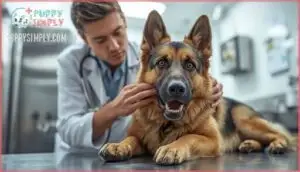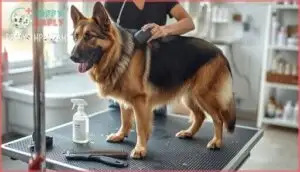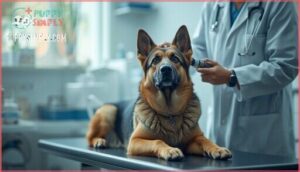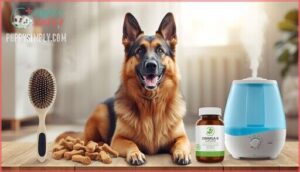This site is supported by our readers. We may earn a commission, at no cost to you, if you purchase through links.

When grooming routines slip or skin problems develop, that signature shepherd scent can quickly cross the line from tolerable to overwhelming.
The good news? Most causes of bad odor are fixable once you identify what’s actually triggering the smell, whether it’s a simple grooming gap or a hidden health concern that needs attention.
Table Of Contents
- Key Takeaways
- Common Causes of Smell
- How to Reduce Bad Smells
- Bathing Tips for German Shepherds
- Checking for Hidden Health Issues
- Managing Skin and Coat
- Food for Less Smell
- When to See The Vet
- Smell Prevention Strategies
- Odor Causing Skin Diseases
- Normal Dog Smell Vs Problem Odor
- Frequently Asked Questions (FAQs)
- Conclusion
Key Takeaways
- German Shepherds don’t naturally smell worse than other breeds, but their thick double coat traps dirt, moisture, and bacteria—turning minor grooming lapses or skin problems into noticeable odors that regular brushing (3-4 times weekly) and bathing every 3-4 months can prevent.
- Most bad smells stem from fixable causes like impacted anal glands (affecting 37% of cases), bacterial or fungal skin infections (worsened by genetic predisposition in the breed), or simple hygiene neglect around ears and paws.
- Diet directly impacts odor—high-quality proteins improve digestibility by 25% and reduce gas, while omega fatty acids and probiotics support healthy skin barriers and decrease gut-related smells by 30-40%.
- Sudden odor changes or persistent smells despite grooming signal underlying health issues like diabetes (sweet breath), kidney problems (urine-like smell), or infections requiring veterinary diagnosis rather than just home care.
Common Causes of Smell
German Shepherds don’t always smell bad, but when they do, there’s usually a reason behind it. The most common culprits are things you can spot and fix with a bit of attention to your dog’s health and hygiene.
Let’s look at three main causes that might be making your shepherd smell less than fresh.
Grooming Issues
If your German Shepherd’s grooming routine has fallen by the wayside, their double coat can quickly become a magnet for odor-causing trouble. Brushing frequency matters—aim for 3–4 times weekly to remove dead hair and distribute natural oils that keep bacteria at bay. When you skip brushing sessions, loose fur and dirt accumulate, trapping moisture that fosters bacterial growth and unpleasant smells.
Bathing habits also play a key role: too often strips protective oils, while too infrequent allows grime to build up. Stick to every 3–4 months with dog-specific shampoo unless your pup gets visibly dirty. Poor coat maintenance, like neglecting undercoat deshedding, creates matted fur that holds moisture and intensifies odors.
Regular brushing is essential because it improves overall air circulation and reduces the risk of skin infections. Don’t forget hygiene essentials either—weekly ear cleaning and monthly nail trimming reduce bacterial hotspots around paws and ears.
Skin Infections
When grooming lapses occur, another culprit often emerges: skin infections. German Shepherds face higher risks for bacterial pyoderma and fungal dermatitis due to genetic predisposition—mutations in their PKP2 gene weaken skin barriers, making it easier for bacteria and yeast to invade. These infections don’t just irritate; they create foul odors from inflamed, weeping lesions. In severe cases, this can manifest as deep pyoderma, requiring more intensive treatment.
Watch for these warning signs:
- Red, itchy patches on the abdomen, inner thighs, or neck that your dog won’t stop scratching
- Hair loss combined with crusty sores or greasy skin texture
- Musty or yeasty smell that persists even after bathing
Environmental triggers like humidity and allergens worsen the problem, while antibiotic resistance complicates treatment in recurring cases. If you spot these symptoms, prompt veterinary care—including cultures and medicated shampoos—can tackle the infection and restore your dog’s fresh scent.
Anal Glands
Beyond skin troubles, another source of that fishy smell lurks near your German Shepherd’s tail. Dogs have two small anal sacs positioned around the anus that produce a foul-smelling fluid for scent marking. When these glands don’t empty naturally during bowel movements, they become impacted—a problem affecting roughly 37% of canine anal gland cases.
German Shepherds face moderate breed predisposition to these issues, with males affected more frequently than females. You’ll notice scooting, excessive licking near the rear, or an intensely fishy odor. Infection risks increase if left untreated, sometimes leading to painful abscesses.
Your vet can perform manual expression techniques and recommend dietary changes to add fiber, helping the glands empty properly.
How to Reduce Bad Smells
Once you know what’s causing the smell, you can take action to keep your German Shepherd fresh. The good news is that most odor problems respond well to a few simple strategies.
Regular grooming practices make a big difference. Weekly brushing distributes natural oils and reduces odor occurrence by up to 74%. Between baths, you can manage smells with dog-safe odor-absorbing sprays or baking soda use on bedding and furniture. Air purifier benefits include lowering airborne odor particles by 63% within an hour.
Here’s what works for German Shepherd odor control:
- Brush your dog three times weekly to prevent matting and improve coat health
- Wash bedding every two weeks with routine bedding wash practices to reduce settled odors by 58%
- Maintain indoor humidity control between 45–55% to limit bacteria growth by 50%
Improving dog hygiene also means checking ears regularly and paying attention to dog dental care, since both contribute to overall freshness. If you’ve addressed grooming and dog diet and smell issues persist, your vet can identify underlying problems.
Bathing Tips for German Shepherds
For best results with German Shepherds, aim to bathe them every 3–4 months using lukewarm water between 98–102°F. This bathing frequency preserves their natural oils while keeping odor under control. Choose a dog-specific, pH-balanced shampoo—oatmeal or hypoallergenic formulas work well for sensitive skin. Brush thoroughly before bathing to remove loose fur, then towel dry immediately after to prevent skin infections from dampness.
Essential bathing practices include:
- Use positive reinforcement and treats to make bath time less stressful for your dog
- Rinse completely to avoid shampoo residue, which can irritate skin and worsen smell
- Dry ears gently after each bath to prevent moisture-related infections
Over-bathing disrupts your dog’s skin microbiome and strips protective oils, so stick to the recommended schedule unless your vet suggests otherwise. Between baths, regular grooming keeps their double coat healthy and reduces the need for frequent washing.
Checking for Hidden Health Issues
Sometimes a bad smell isn’t just about needing a bath—it could signal deeper health problems lurking beneath the surface. That’s why regular veterinary checkups are essential for catching underlying health issues before they worsen.
During wellness exams, your vet performs thorough assessments to identify medical problems like periodontal disease, which affects up to 80% of dogs over three years old and causes persistent bad breath. They’ll also check for metabolic odor signs such as fruity breath from diabetes or ammonia-like smells linked to kidney failure.
These serious medical conditions in dogs often appear alongside symptoms like increased thirst, lethargy, or weight loss. Early detection through routine blood work and urine tests helps with disease management and reduces odor intensity.
Your vet can examine teeth for infections, assess skin for yeast overgrowth, express anal glands if needed, and evaluate internal organ health. Veterinary diagnostics pinpoint what’s causing the smell so you can address dog diseases with proper treatment rather than just masking dog symptoms temporarily.
Managing Skin and Coat
With the right approach to coat hydration and grooming, you can drastically cut down on unwanted odors while keeping your German Shepherd’s skin healthy. Their dense double coat demands consistent care—brushing two to three times weekly distributes natural oils and removes trapped debris that breeds bacteria. Professional grooming every few months addresses stubborn shedding and deep-cleans areas you might miss at home.
Bathing every four to six weeks with breed-specific products maintains oil balance without stripping protective layers. Over-bathing actually backfires, ramping up sebum production and intensifying smell. Between baths, check ears weekly for moisture buildup that leads to infections, especially after swimming or rainy walks.
Seasonal adjustments matter too. During spring and fall shedding peaks, increase brushing frequency to manage the extra hair turnover. Feed a diet rich in omega fatty acids—this nourishes skin from within, reducing flakiness and the skin conditions that invite odor-causing microbes.
Food for Less Smell
What your dog eats shapes how they smell from the inside out. Protein quality matters—high-grade proteins like insect-based or fish formulas improve digestibility by up to 25%, cutting down on fecal odor and gas from undigested leftovers fermenting in the gut. Limited ingredients help too, especially grain-free options with oats or lentils that reduce allergy-triggered skin issues contributing to mustiness.
Omega balance is critical; omega-3 and omega-6 fatty acids support healthy skin barriers and minimize sebum oxidation that breeds bacterial odor. Probiotics boost gut microbiota, decreasing sulfur gas production by 30–40% in dogs with digestive imbalances.
Omega fatty acids strengthen skin barriers while probiotics reduce gut-related odors by up to 40% in dogs
Even vegan diets, when carefully formulated to meet nutritional needs, lower fecal metabolites like phenol and indole—compounds notorious for stench. Switching to hypoallergenic formulas tackles food allergies while sustainable proteins produce less methane and inflammatory responses that intensify smell.
When to See The Vet
When should you call your vet instead of reaching for the shampoo bottle? A sudden odor change or persistent bad smell that doesn’t budge with grooming signals underlying health issues in German Shepherds. If your dog’s smell shifts dramatically—maybe breath turns sweet (diabetes warning) or urine-like (kidney trouble)—medical problems need assessment.
Watch for these red flags requiring immediate vet attention:
- Visible discomfort signs: Your dog scooting across the floor, obsessively licking their rear, or showing pain around skin lesions with foul discharge points to anal gland impaction or infection needing professional help.
- Systemic illness signs: Lethargy, vomiting, weight loss, or neurologic changes like seizures paired with new odors suggest toxin exposure or metabolic disease requiring urgent evaluation.
- Discharge assessment: Purulent, bloody, or malodorous discharge from ears, wounds, or any body opening indicates infection—bacterial pyoderma or otitis externa won’t resolve without targeted therapy.
Symptoms of dog illness accompanied by intensifying stench mean it’s time to escalate beyond home care.
Smell Prevention Strategies
Think of preventing odor like maintaining a car—consistent upkeep beats emergency repairs every time. Your German Shepherd’s smell stays manageable through routine cleaning and proactive grooming practices.
Weekly brushing drops surface allergens by up to 80%, while daily pet-safe grooming wipes reduce odor-causing bacteria by 40% within two weeks. Don’t skip dental care—dogs whose teeth are brushed more than weekly show lower buildup scores.
Diet management matters too; proper hydration cuts oil-related smells by 30%, and omega-3-rich foods decrease skin flakiness that traps odors.
Clean your dog’s bedding weekly to drop indoor allergen concentrations by 55–75%, and maintain home humidity between 40–60% for environment control that inhibits bacterial growth.
Odor Causing Skin Diseases
Preventive care goes hand-in-hand with recognizing when skin diseases cause the problem. German Shepherds face specific skin conditions that produce strong odors you can’t ignore.
Atopic dermatitis affects many of these dogs, usually showing up between 6 months and 3 years of age. This genetic predisposition weakens your dog’s skin barrier, letting allergens and bacteria penetrate deeper layers. You’ll notice intense itching, redness, and a persistent smell that won’t wash away easily.
Bacterial pyoderma strikes German Shepherds frequently—they account for roughly one-third of cases. Staphylococcus bacteria create draining tracts, ulcers, and that unmistakable foul odor from tissue breakdown.
Malassezia dermatitis brings yeast overgrowth in warm, moist areas like ears and paws, producing a distinct musty smell. Seborrheic dermatitis disrupts your dog’s skin oils, causing greasiness and rancid odors from abnormal lipid breakdown.
These skin infections need veterinary diagnosis and targeted treatment—don’t wait for the smell to worsen.
Normal Dog Smell Vs Problem Odor
Understanding the difference between your German Shepherd’s normal scent and a problem odor can save you a trip to the vet—or help you catch something serious early. Healthy dogs naturally emit low levels of volatile organic compounds, usually between 9–15 micrograms per cubic meter. That mild smell comes from normal skin oils, bacteria, and moisture in their thick double coat.
Problem odors tell a different story. They’re stronger, localized, and often come with visible signs like redness or discharge. Here’s how to spot the difference:
| Normal Dog Smell | Problem Odor |
|---|---|
| Mild, consistent scent across days | Progressively intensifying smell |
| No skin changes or discomfort | Accompanied by redness, crusting, discharge |
| Distributed evenly over body | Concentrated in ears, paws, or anal area |
| Disappears after routine bathing | Persists despite cleaning |
If your German Shepherd’s odor suddenly changes or won’t go away with regular hygiene, that’s your cue to investigate further. Trust your nose—it’s often the first diagnostic tool for catching dog health issues before they escalate.
Frequently Asked Questions (FAQs)
What smells do German Shepherds like and not like?
German Shepherds prefer berry, mint, and floral scents like lavender, which engage their 225 million olfactory receptors and promote calm behavior.
They avoid citrus and strong herbal odors, which trigger stress responses and avoidance.
Do male or female German Shepherds smell worse?
Males tend to have more skin infections and allergies, which can cause stronger odors. Females may emit hormonally-driven estrus odor during heat cycles, but male infections and sebum production generally cause more persistent smell issues.
Can stress or anxiety increase my dogs odor?
Yes, stress and anxiety can increase your dog’s odor. When your German Shepherd feels anxious, their body releases stress hormones that alter scent glands and skin secretions, producing stronger odor compounds detectable to both you and other dogs through olfactory stress detection.
Why does my German Shepherd smell after rain?
Rain triggers that classic wet dog smell because moisture activates bacteria and yeast on your German Shepherd’s double coat.
These microbes release volatile organic compounds—like geosmin—that create the musty odor. The thick undercoat traps rainwater, prolonging drying and worsening the smell.
Do certain colors of German Shepherds smell more?
No, coat color doesn’t influence German Shepherd odor. Like judging a book by its cover, pigment alone won’t predict dog smell.
Odor stems from skin health, grooming, and genetics—not whether your German Shepherd sports black, tan, or sable fur.
How long does typical dog smell last indoors?
Dog odor generally lingers indoors for days to weeks, depending on ventilation and material absorption. Carpets and upholstery hold smells longer than hard surfaces, while proper air purification and increased airflow speed up dissipation considerably.
Conclusion
Think of your German Shepherd’s coat like a sponge—left damp or dirty, it breeds trouble that turns heads for all the wrong reasons. Most cases of why German Shepherds smell bad trace back to fixable issues: skipped baths, trapped moisture, infected skin folds, or impacted anal glands.
Stay ahead with consistent grooming, quality nutrition, and quick attention to unusual odors. When something smells off despite your best efforts, your vet can pinpoint hidden infections or allergies before they escalate into chronic problems.














